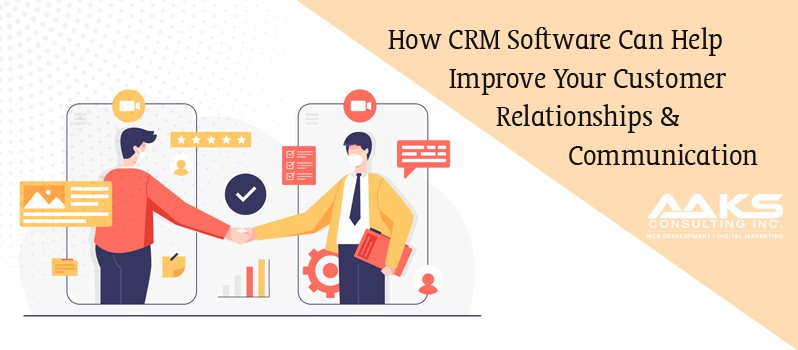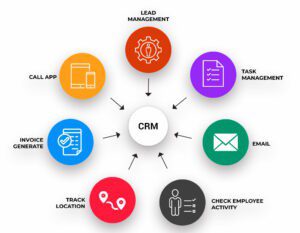How CRM Software Can Help Improve Your Customer Relationships & Communication
The importance of customer relationships and communication to the success of any business cannot be overstated. With the right customer relationship management (CRM) software, businesses can ensure that their customer relationships are not only strengthened but also managed efficiently. In this article, we’ll explore how CRM software can help improve your customer relationships and communication.
Introduction to CRM Software
CRM software is a powerful tool that can help businesses improve their customer relationships and communication. By tracking customer data and interactions, businesses can gain valuable insights into customer behavior and preferences. This information can then be used to tailor marketing and sales strategies to better meet the needs of customers. In addition, CRM software can help businesses streamline their communication with customers, making it easier to resolve issues and provide excellent customer service.
Benefits of Implementing CRM Software
There are countless benefits of implementing CRM software within your business. Perhaps the most obvious benefit is that it can help to improve your customer relationships. By having all of your customer data in one place, you can more easily keep track of communication, follow up on leads, and provide a better overall experience to your customers. Additionally, CRM software can help improve internal communication by providing a central place for employees to access customer information. This can lead to faster resolution of issues and improved customer satisfaction. Finally, CRM software can help you to better understand your customers through data analysis. By understanding who your customers are, what they want, and how they interact with your business, you can make informed decisions about marketing campaigns, product development, and other strategic decisions.
How Does CRM Software Work?
CRM software is designed to help businesses manage their customer relationships. It can automate and streamline customer-related tasks, such as contact management, sales tracking, and marketing campaigns. CRM software can also help businesses improve communication with their customers. By keeping track of customer interactions and preferences, businesses can provide better customer service and support. In addition, CRM software can help businesses develop more effective marketing strategies. By understanding their customers better, businesses can target their marketing efforts more effectively and ultimately improve their bottom line.
Common Features of CRM Software
CRM software is designed to help businesses manage their customer relationships. It can be used to track customer interactions, sales, and marketing campaigns. CRM software can also help businesses improve their customer communication.
Some common features of CRM software include:
-Contact management: CRM software can be used to store and manage customer contact information. This information can be used to send out communications or follow up with customers.
-Sales tracking: CRM software can be used to track sales data. This data can be used to analyze sales trends and performance.
-Marketing campaign management: CRM software can be used to manage marketing campaigns. This includes creating and tracking marketing goals, designing campaigns, and measuring results.
-Customer communication: CRM software can be used to improve customer communication. This includes creating automated email and SMS messages, as well as live chat support.
Examples of Popular CRM Systems
Salesforce: Salesforce is a popular CRM system that helps businesses manage their customer relationships. It offers features such as contact management, task management, and opportunity management.
Zoho CRM: Zoho CRM is another popular CRM system that helps businesses manage their customer relationships. It offers features such as contact management, lead management, and sales automation.
Insightly: Insightly is a popular CRM system that helps businesses manage their customer relationships and sales pipeline. It offers features such as contact management, task management, and opportunity tracking.
The Benefits of Integrated Automation and AI
The benefits of integrating automation and AI into your CRM software are many and varied. Perhaps the most obvious benefit is the time saved by automating tasks that would otherwise need to be carried out manually. This can free up valuable time for you and your team to focus on other tasks, or simply to take a break.
In addition, automating tasks can help to improve the accuracy of your data entry, as well as reducing the chances of human error. This is particularly important when dealing with sensitive customer information.
AI-powered features such as chatbots can also help to improve customer communication, by providing quick and easy answers to common queries. This can help to reduce support costs, as well as increasing customer satisfaction levels.
Tips for Choosing the Right CRM System
When it comes to customer relationship management (CRM), there is no one-size-fits-all solution. The right CRM system for your business will depend on a number of factors, including the size and type of your business, your budget, and your specific needs.
To help you choose the right CRM system for your business, here are a few tips:
1. Define your needs.
Before you start shopping for a CRM system, it’s important to take a step back and evaluate what you need from a CRM system. What are your specific goals? What features are most important to you? Answering these questions will help you narrow down your options and choose a CRM system that’s right for your business.
2. Do your research.
Once you know what you’re looking for in a CRM system, it’s time to start doing some research. Read online reviews, talk to other businesses in your industry, and get recommendations from friends or colleagues. This will help you get a feel for which CRM systems are the best fit for your business.
3. Consider your budget.
CRM systems can range in price from free to hundreds of dollars per month. It’s important to consider your budget when choosing a CRM system so that you don’t end up spending more than you can afford. Free or low-cost options may be ideal for small businesses or businesses on a tight budget.
4. Test out the system.
Once you have narrowed down your options, it’s important to test out the CRM systems that you are considering. This will help you get a better understanding of how the system works and whether or not it meets your needs. Most CRM systems offer free trials, so take advantage of this to see if the system is right for you.
Choosing the right CRM system for your business doesn’t have to be difficult. By following these tips, you can find a CRM system that meets all of your business needs and fits into your budget.
Conclusion
CRM software can be a great asset for any business looking to improve their customer relationships and communication. By providing an all-in-one solution that streamlines the customer service process, it has never been easier to stay connected with your customers and provide them with an exceptional experience every time. From sales tracking and automated emails to real-time analytics, CRM software will help you build stronger relationships with your customers so that you can ensure their satisfaction each step of the way.





